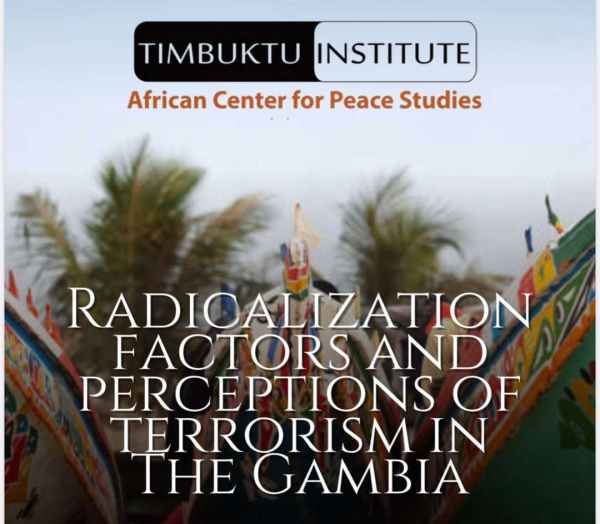New Study : Radicalization Factors and Perceptions of Terrorism in The Gambia Spécial
Timbuktu Institute – July 2025
(Download Full Report here)
After the publication of a first policy paper in 2023 on “Violent Extremism: Why should The Gambia Learn from the Sahel mistakes”, the Timbuktu Institute - African Center for Peace Studies, presents a rigorous and comprehensive analysis in its 2025 report, titled "Radicalization Factors and Perceptions of Terrorism in The Gambia." This study systematically investigates the multifaceted dynamics of radicalization and violent extremism within The Gambia, a nation that has thus far demonstrated resilience against the escalating terrorist threats observed across West Africa and the Sahel.
Conducted under the scientific coordination of Dr. Bakary Sambe, the research elucidates the socio-economic, cultural, and religious determinants shaping perceptions of terrorism, particularly among Gambian youth. The findings underscore that socio-economic precarity, notably poverty, youth unemployment, and social exclusion, constitutes the primary drivers of radicalization, exacerbated by a constrained labor market and limited economic opportunities. Despite these vulnerabilities, The Gambia’s entrenched cultural and religious tolerance, predominantly rooted in Sufi Islam and reinforced by interfaith harmony, serves as a significant protective factor against extremist ideologies.
However, the study identifies emerging risks, including intra-Islamic tensions that could be exploited by radical actors. A gender-sensitive analysis highlights the critical role of women in countering radicalization, advocating for their inclusion in national strategies, consistent with UN Security Council Resolution 1325. A striking 99% of respondents reported no awareness of governmental or civil society initiatives to combat extremism, revealing a critical gap in public engagement and counter-terrorism efforts. Furthermore, the research documents strong public support for regional security cooperation, particularly with Senegal and the Economic Community of West African States (ECOWAS), reflecting historical and ongoing collaborations.
Methodologically, the study adopts a mixed-methods approach, integrating quantitative data from a stratified random sample of respondents across The Gambia’s eight administrative regions with qualitative insights derived from 30-40 semi-structured interviews with key stakeholders, including religious leaders, youth, women, and civil society representatives. The use of stratified sampling and the snowball method ensures a robust and representative dataset, minimizing biases and capturing nuanced perspectives. The analysis is structured around key themes: the conceptualization of radicalization and violent extremism, the identification of causal factors and actors, the gender dimension, resilience factors, and strategic recommendations for prevention. The report proposes evidence-based recommendations to mitigate radicalization risks in the Gambia and reinforce resilience.
While The Gambia has not experienced the scale of violent extremism observed in the Sahel, the study warns of latent risks stemming from youth marginalization, governance deficits, and religious tensions, necessitating proactive and holistic interventions. This report serves as an essential resource for policymakers, researchers, and practitioners engaged in peacebuilding and counter-terrorism efforts.
Dernier de Timbuktu Institute
- منتدى الدوحة:نحو مقاربة قطرية لوضع حد للأزمات في الساحل
- « Le profil idéal du futur président de la Commission devrait allier expertise économique, jeunesse et expérience en diplomatie inclusive »
- ECOWAS : why Senegal's presidency is both a victory and a major test
- Cedeao : pourquoi la présidence du Sénégal est à la fois une victoire et un test majeur
- REPORT – JNIM Offensive : Between “Economic Jihad” and the Threat to Foreign Interests
